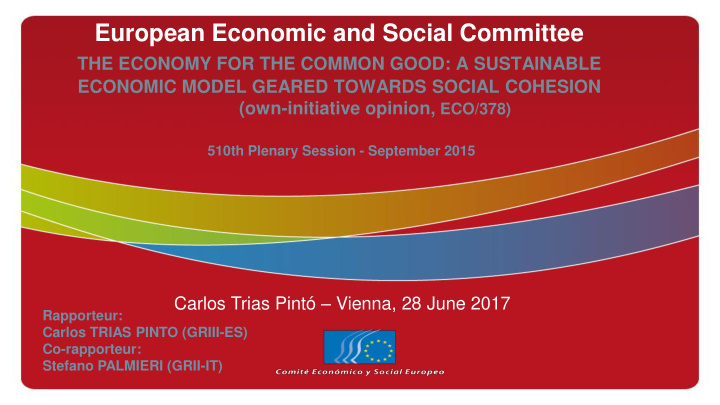



European Economic and Social Committee THE ECONOMY FOR THE COMMON GOOD: A SUSTAINABLE ECONOMIC MODEL GEARED TOWARDS SOCIAL COHESION (own-initiative opinion, ECO/378) 510th Plenary Session - September 2015 Carlos Trias Pintó – Vienna, 28 June 2017 Rapporteur: Carlos TRIAS PINTO (GRIII-ES) Co-rapporteur: Stefano PALMIERI (GRII-IT)
1. Current context o Article 3(1), (2) and (3) of the Treaty on European Union o Key terms : well-being of its peoples, sustainable development, balanced economic growth, highly competitive social market economy, full employment, social progress, quality of the environment, equality between women and men, economic, social and territorial cohesion... (heavenly music) o From word to deed? (Only partially) o European Semester (coordination of economic policies) : scoreboard mainly includes macroeconomic and budgetary indicators. Should social indicators be added to better measure performance in the Member States? o Well-established principle in the EU : the polluter pays. And those who remove pollution should earn? Towards a rewards system?
2. A business environment in transition • The economy must serve people. Businesses must actively contribute to this goal. Are they doing so? What are companies reporting on? Is the information comprehensive, • rigorous and relevant? • Dichotomy: what supply says vs calls from the demand side. What is going on? • Are we making use of other indicators of business performance, beyond accounts and other indicators that companies are free to configure themselves?
3. Regulatory progress (encouraging prospects) • In Spain • Law 31/2014 reforming the law on limited companies (12 recommendations from 2006 relating to the membership and role of the board – with an annual evaluation – are now mandatory in terms of corporate governance ) • In the European Union • Directive 2014/95/EU : disclosure of non-financial and diversity information in management bodies (the UN SDGs and the UN Global Compact are good references in terms of including environmental and social issues, and issues relating to human rights and the fight against corruption, in large companies' annual reports)
3. Regulatory progress (encouraging prospects) • Commission's goal to develop an overarching and comprehensive EU strategy on sustainable finance as part of the Capital Markets Union: Guidelines on the disclosure of environmental and social information. (26/06/2017) • Directive 2014/24/EU on public procurement (calculation of life cycle costs, including environmental externality costs linked to the product or service) • Opportunity (missed?) : A revised 2016 CSR Strategy , European Commission: Will it have the desired scope?
4. Guidelines for the common good • Maxim : businesses must help bring about the common good (and make it clear) • Social economy as a key driver (historical source – mid-19th century, based around principles and common values) • Brand Europe = competitive advantage? Provided that we forge partnerships with citizens (consumers are intelligent and opt for ethics, not just aesthetics, but proper communication is essential)
4. Guidelines for the common good • Recognition of CSR, giving a new impetus to ethics • Going beyond voluntary participation and self-regulation , moving towards mandatory participation and objective definition of parameters • Thus external auditing to assess the results • Conditionality (with legal consequences): + benefits for demonstrating better behaviour • Rewards (for generating positive externalities): improved access to public contracts, support for internationalisation, preferential access to lending and Mutual Guarantee Societies
5. Challenges • Influencing the EU institutions (European Commission, Parliament and Council) and the 28 Member States, taking advantage of the New Economies phenomenon • Bringing about the common good by means of local and regional administrations (social innovation in the business ecosystem and in entrepreneurship) • Stimulating public support for the common good, promoting the common good
European Economic and Social Committee "A bridge between organised civil society and the EU institutions" THANK YOU carlos@triaswebb.e.telefonica.net
Recommend
More recommend